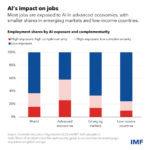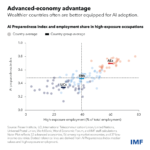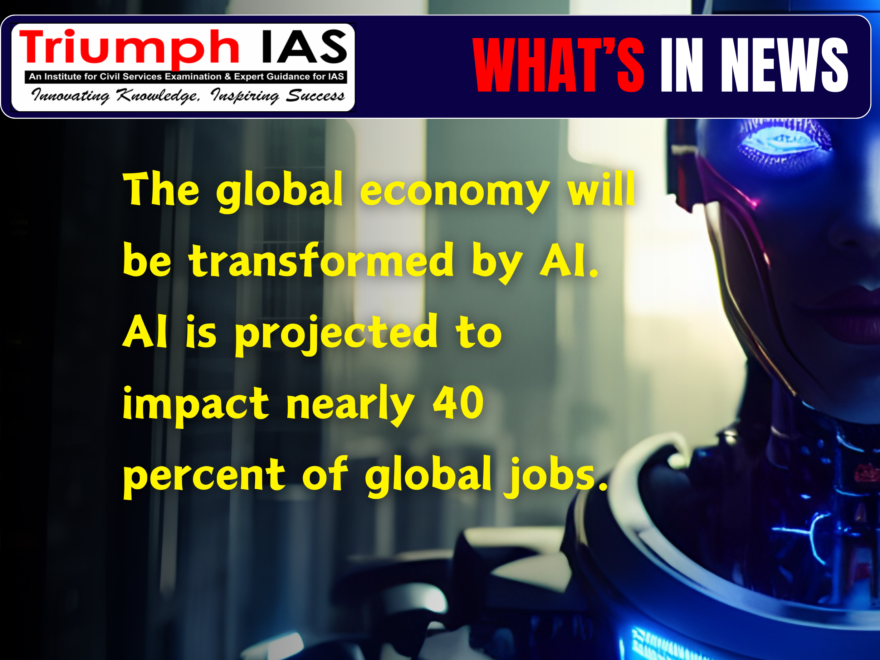The global economy will be transformed by AI. AI is projected to impact nearly 40 percent of global jobs.
Why in News
We are on the verge of a technological revolution that has the potential to kickstart productivity, increase global economic growth, and raise incomes worldwide. However, it also has the potential to displace jobs and widen inequality.
The rapid progress of artificial intelligence has captured the world’s attention, sparking both enthusiasm and concern while prompting important questions about its potential impact on the global economy. The overall effect is hard to predict, as AI will have complex ripple effects on economies. What we can confidently state is that we will need to develop a set of policies to effectively harness the immense potential of AI for the betterment of humanity.
Transforming the Essence of Employment
IMF staff have conducted a new analysis on the potential impact of AI on the global labor market. While many studies have predicted that AI will replace jobs, it is also likely to complement human work in many cases. The IMF analysis takes into account both of these factors.
The results are significant: nearly 40 percent of global employment is vulnerable to AI. Historically, automation and information technology have mainly affected routine tasks, but AI stands out for its ability to impact high-skilled jobs. Consequently, advanced economies face higher risks from AI, but also have more opportunities to utilize its benefits compared to emerging market and developing economies.
In advanced economies, around 60 percent of jobs could be influenced by AI. Approximately half of these jobs could benefit from AI integration, leading to increased productivity. However, the other half may see AI applications taking over tasks currently performed by humans, potentially reducing labor demand, leading to lower wages and decreased hiring. In extreme cases, some of these jobs may even disappear.
In contrast, AI exposure is expected to be 40 percent in emerging markets and 26 percent in low-income countries. These findings indicate that emerging market and developing economies may experience fewer immediate disruptions from AI. However, many of these countries lack the infrastructure or skilled workforce to fully utilize the benefits of AI, increasing the risk of worsening inequality among nations over time.

AI has the potential to impact income and wealth inequality within countries. It is possible that we will see a division within income groups, where workers who are able to utilize AI experience an increase in their productivity and wages, while those who are unable to use AI fall behind. Studies indicate that AI can help less experienced workers improve their productivity at a faster rate. Younger workers may find it easier to take advantage of opportunities presented by AI, while older workers may struggle to adapt.
The impact on labor income will depend largely on how much AI complements high-income workers. If AI significantly complements higher-income workers, it could result in a disproportionate increase in their labor income. Additionally, the increased productivity from firms adopting AI may lead to higher returns on capital, further benefiting high earners. Both of these factors could contribute to widening inequality.
In most cases, AI is expected to exacerbate overall inequality, which is a concerning trend that policymakers need to address proactively in order to prevent the technology from increasing social tensions. It is essential for countries to establish comprehensive social safety nets and provide retraining programs for workers who are vulnerable to the effects of AI. By doing so, we can make the transition to AI more inclusive, safeguarding livelihoods and reducing inequality.
A world driven by AI that is inclusive
AI is rapidly being incorporated into businesses worldwide, highlighting the importance of policymakers taking action. To assist countries in developing appropriate policies, the IMF has created an AIP preparedness Index that evaluates readiness in areas such as digital infrastructure, human capital and labor market policies, innovation and economic integration, as well as regulation and ethics. For instance, the human capital and labor market policies component considers factors such as education levels and labor market flexibility, as well as the percentage of the population covered by social safety nets. The regulation and ethics component assesses a country’s legal framework’s adaptability to digital business models and the existence of strong governance for effective enforcement. Using this index, the IMF evaluated the readiness of 125 countries and found that wealthier economies, including advanced and some emerging market economies, are generally better prepared for AI adoption than low-income countries, although there is significant variation among countries. Singapore, the United States, and Denmark achieved the highest scores on the index due to their strong performance across all four categories measured.

Emerging Possibilities of jobs in the Field of AI Development
AI is the field dedicated to creating intelligent machines through science and engineering. As AI becomes more prevalent, it will generate fresh opportunities for individuals to construct, code, and uphold these intelligent machines. Presently, there is a vast number of job positions in AI within organizations worldwide, but there is a shortage of qualified workers to fill these roles.
The expansion of AI will lead to the creation of new positions in engineering, software design, and programming. This means that for every individual who loses their job as a clerk, security agent, or factory worker, there will be an increase in the employment of data detectives, robotics engineers, machine managers, and programmers.
“Success in creating AI would be the biggest event in human history. Unfortunately, it might also be the last, unless we learn how to avoid the risks.”
—Stephen Hawkins
Source From: IMF
About Artificial Intelligence (AI)
|
Sociology Optional Program for
UPSC CSE 2025 & 2026
 |
 |
 |
 |
 |
 |
Follow us :



